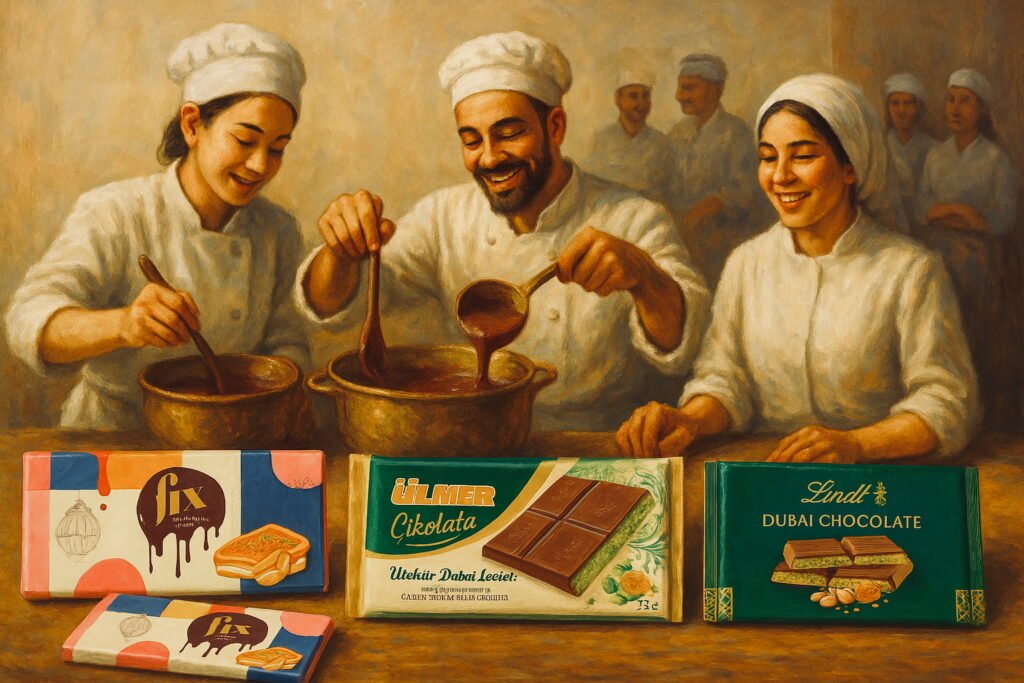Dubai Chocolate: A Great Viral Brand That Nobody Owns

What’s with the hype behind “Dubai Chocolate”? It started with FIX, a UAE-based chocolatier, which launched a luxurious layered bar that quickly became one of the fastest-selling chocolates in history. Dubai Chocolate is a type of chocolate bar made with a filling of pistachio and kadayif (or knafeh). The filling is mixed with butter and then combined with the chocolate.
The original was branded “Can’t Get Knafeh Of It”, and it was born from the pregnancy cravings of FIX’s founder, Sarah Hamouda. Its blend of Middle Eastern flavours and indulgent texture made it an instant hit. A viral video from 2023 by a TikTok influencer sampling the bar in their car received over 125 million views. This elevated Dubai Chocolate to the public consciousness, and global demand for the bars exploded.
In April 2025, over 1.2 million bars were sold at Dubai Duty Free, generating around $22 million in revenue. FIX produces around 500 bars daily, exclusively in the UAE, with sales limited to two online slots per day. The deliberate scarcity has fuelled global demand, leading to supermarket rationing, resale listings on eBay reaching €60 per bar, and even reports of smuggling.
Sensing an easy opportunity, a wave of imitators has entered the market. Major brands like Lindt, Trader Joe’s, and Shake Shack, along with artisan makers such as Maison Samadi, have introduced their takes on the viral treat. These lookalikes now appear in both boutique chocolate shops and major retail chains, often labelled simply as “Dubai Chocolate.” Since FIX does not own that designation, there’s little they could do to stop the competition.
Understanding What Can Be Protected
While FIX is credited as the creator of the original Dubai Chocolate bar, the name itself is not their property. Geographical terms like “Dubai” are typically not ownable as trademarks unless they have acquired distinctiveness and are not merely descriptive of where a product comes from. “Dubai Chocolate” is a descriptive name that refers to a type of chocolate with ties to Dubai in style or origin. Descriptive names like this can be used by other traders unless proven to have gained secondary meaning and distinctiveness.
In this case, however, the chance of “Dubai Chocolate” gaining distinctiveness is no longer possible. The product went viral so quickly and has been adopted by so many other traders around the world that it now functions as a generic category of chocolate rather than a unique brand. Once a term is in widespread use, it becomes a common term that is usable by all players in the industry.
How about the recipe? It could have been protected as a trade secret if it had been kept confidential. But when FIX publicised the product and its ingredients, that protection was lost. Trade secrets rely on secrecy. Without it, anyone can reverse-engineer or replicate the formula.
What is protectable? Branding elements such as the mother brand FIX, the distinctive product name “Can’t Get Knafeh Of It”, the logo, and taglines can all be registered as trademarks. Copyright protects creative assets like product photos, packaging design, and marketing materials. These elements come together to build the company’s brand identity and provide some commercial protection against unfair competition, even if FIX cannot stop the competition from using the name and recipe for Dubai Chocolate.
Being First Still Counts
Even without strict IP rights, there’s still value in being the first movers in the market. FIX needs to continue marketing itself as the pioneer behind Dubai Chocolate and lean into its compelling backstory and authentic origin. That origin story carries emotional weight and brand equity that imitators can’t duplicate.
While viral success invites imitation, branding is more than just registering trademarks. One needs to own their story, claim their identity, and communicate it to the consumers. FIX may not be able to stop others from making “Dubai-style” chocolate bars, but they can continue to celebrate their brand, innovate new flavours, and stay visible in the public consciousness.
